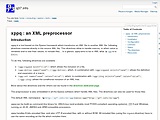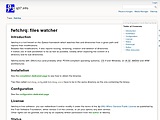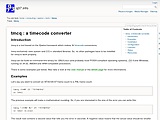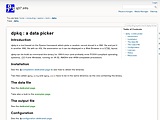 xppq is a command-line tool which transforms an XML file to another XML file, following directives inserted directly in the source XML file. This directives allow to handle macros, to affect value to variables and to test their values, to include files… In a glance, xppq aims to be to XML what cpp is to C/C++. It is developed in C++, and uses only system and C/C++ standard libraries, so it doesn't need third party components. It can run on GNU/Linux (and probably most POSIX-compliant operating s
xppq is a command-line tool which transforms an XML file to another XML file, following directives inserted directly in the source XML file. This directives allow to handle macros, to affect value to variables and to test their values, to include files… In a glance, xppq aims to be to XML what cpp is to C/C++. It is developed in C++, and uses only system and C/C++ standard libraries, so it doesn't need third party components. It can run on GNU/Linux (and probably most POSIX-compliant operating s
 fwtchrq is a command-line tool, based on the Epeios framework, which watches files and directories from a given path and reports their modifications. Besides files modifications, it also reports moving, renaming, creation and deletion of directories. It's written in C++ and makes use of task parallelism to be as fast as possible, notably when exploring the content of a directory and its sub-directories. It uses only system and C/C++ standard libraries, so it doesn't need third party components.
fwtchrq is a command-line tool, based on the Epeios framework, which watches files and directories from a given path and reports their modifications. Besides files modifications, it also reports moving, renaming, creation and deletion of directories. It's written in C++ and makes use of task parallelism to be as fast as possible, notably when exploring the content of a directory and its sub-directories. It uses only system and C/C++ standard libraries, so it doesn't need third party components.
 tmcq is a command-line tool which makes timecode conversions. It is developed in C++, and uses only system and C/C++ standard libraries, so it doesn't need third party components. It can run on GNU/Linux (and probably most POSIX-compliant operating systems), OS X and Windows, natively on IA-32, AMD64 and ARM architectures.
tmcq is a command-line tool which makes timecode conversions. It is developed in C++, and uses only system and C/C++ standard libraries, so it doesn't need third party components. It can run on GNU/Linux (and probably most POSIX-compliant operating systems), OS X and Windows, natively on IA-32, AMD64 and ARM architectures.
 dpkq is a command-line tool which picks a random record stored in a XML file and put it in another XML file with an XSL file association so it can be displayed in a web browser in a HTML layout. It is developed in C++, and uses only system and C/C++ standard libraries, so it doesn't need third party components. It can run on GNU/Linux (and probably most POSIX-compliant operating systems), OS X and Windows, natively on IA-32, AMD64 and ARM architectures.
dpkq is a command-line tool which picks a random record stored in a XML file and put it in another XML file with an XSL file association so it can be displayed in a web browser in a HTML layout. It is developed in C++, and uses only system and C/C++ standard libraries, so it doesn't need third party components. It can run on GNU/Linux (and probably most POSIX-compliant operating systems), OS X and Windows, natively on IA-32, AMD64 and ARM architectures.
|